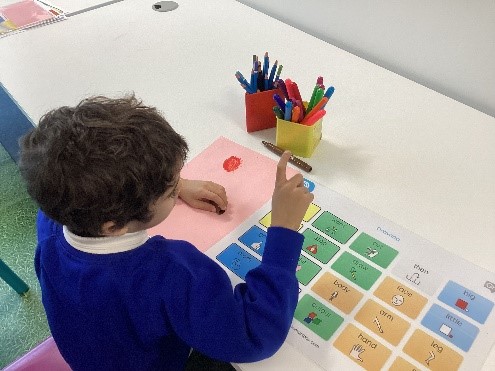The Team
St Nicholas School has a full time Speech and Language Therapist. Gentry Hobson (Highly Specialist Speech and Language Therapist/SALT lead). Katy Bourne, Olivia Murphy and Shermeen Ahmed are our school based Speech and Language Therapy Assistants. Croydon Health Services NHS Trust also provide Speech and Language Therapy to the school for years 4,5 and 6. They are currently attending 2 days per week.


Areas we cover
- Attention and Listening
- Social Communication & Play
- Understanding of Language
- Expressive Language
- Alternative and Augmentative Communication (AAC)
- Speech Sounds
- Eating, Drinking & Swallowing difficulties

St Nicholas School SALT team provide Universal and Targeted support to the whole school, and specialist support to children in Reception, Year 1, Year 2 and Year 3. NHS SALT team provide support to those children in Years 4, 5 and 6.
Some of the duties of the SALT team are:
- Working in the classroom settings - liaising with staff and working with children as part of their classroom experiences to share good practice, regularly review progress and plan next steps for communication skills. This achieved through education and health care plan reviews (EHCPS) known to SALT annually and through one-page profiles to identify a child’s communication skills
- Jointly plan classroom activities/ ideas in order to incorporate communication across the day
- Support each other and class teams on how to generalise new communication skills across the various environments accessed
- Provide a baseline level of training for all staff on communication across the setting
- Ensure that communication targets are embedded across all areas of the Curriculum.
- Keep other professionals updated on our children and their means of communication e.g. OT, Paediatrician, to support Multi-Disciplinary working between professionals.
- Refer onto additional services in a timely and appropriate way (as required)
- Identify and prioritise children based on their needs in relation to the school environment and their clinical need.
- Engage with parents/carers in a purposeful and timely way ensuring that communication skills can be integrated into the family home and supporting parents/carers with training and liaison when needed.
The Balanced System Model
The Speech and Language Therapy team work to the Balanced System Model. The Balanced System builds on the clear expectations from Bercow, Ofsted and the National Curriculum that communication is a shared responsibility and all staff have a duty to support the development of the communication skills of the children within St Nicholas School.
Key to the model is collaborative working - it is about working with staff to enhance communication, which will benefit every child at St Nicholas School. The way in which we support each child is different and will vary depending on their needs.
Targeted Support
These children are not on caseload. Their needs can be met by the specialist teachers and their EHCP/targets are reviewed by the class team. These children will also have access to:
- Communication groups
- Other targeted interventions run by school staff e.g. language groups, social skills, life skills
- Advice clinics
- Specific training on targeted interventions for staff and parents.


Specialist Support
Indirect- This is a specific piece of work with a child working on targets. A member of the SALT team will identify the strategies and support a child needs jointly with the class team/parents and targets will be set.
Targets are worked on by the class team with support from the SALT team as needed.
Targets are reviewed by the therapist at the end of the set period of time and next steps are laid out.
Direct- Targets are set jointly with the class team/parents. The child receives direct intervention from the therapy team. This could be through 1:1/group sessions for an identified period of time or where stated in their EHCP. Targets are reviewed by the SALT team at the end of a set period of time and next steps are laid out.
Moving from specialist to targeted and/or universal is not about discharging a child; it is about looking at how their needs are best met, always keeping in mind that the levels of intervention build on, rather than replace, one another. A caseload child is one who needs SALT to assess, set targets and review them. However, their intervention (between target setting and review) may be at a specialist level (i.e. delivered by a member of the SALT Team) or at a targeted level (delivered by school / settings staff).
If universal isn’t enough, then a child needs universal AND targeted; if universal and targeted are not enough, then a child needs universal AND targeted AND specialist - it is not a case of either / or.
Specialist level interventions cannot and should not happen in isolation - it is not in the best interests of the child.

Advice Clinics are:
- The referral process into SALT/specialist level support. This is so the therapist can meet with the parent/carer to discuss their concerns as well as speaking to school staff, to then decide what level of support is best needed for the child and to give strategies on how to support them in school and at home. This does not mean that a child will move to specialist level support automatically if targeted support has not been offered first.
- The referral back to SALT/specialist level support.
- An opportunity for all parents to meet with the therapist to discuss any concerns or seek strategies to work on communication strategies at home/EHCP queries.
Advice clinic slots will be offered on a termly basis for all parents and are given on a first come first serve basis.
When to refer to Speech and Language Therapy
Both the NHS and School SALT team accept referrals if targeted level support has not been successful when:
- A child does not have a communication system
- A child has made really good progress with a communication system and you want to know the next steps are
- You’re not sure how to use the communication system
- A change in behaviour which is trying to communicate something
- A communication system is not working and the child does not seem to be making progress.
- You need help with setting targets
- Any concerns about communication or social skills
Working with parents and carers
As a school we are committed to supporting parents in developing their understanding of their child’s communication needs and in their communication with their child. We do this in the following ways:
- The language and communication needs and targets are shared with parents/carers during parents evening and Educational Health Care Plan (EHCP) reviews.
- For pupils on the SALT caseload, their specific SALT programmes/targets are also continually shared with parents and carers.
- Resources and keywords from individual SALT sessions may also be sent home, where appropriate.
- Support through the school website for parents to access and use communication resources e.g. links to the Makaton sign of the week on the school Twitter feed.
- Termly advice clinics with the SALT Team
- Coffee mornings
- Chill and Chat
- Training on communication as a whole
- Specific training on targeted interventions
